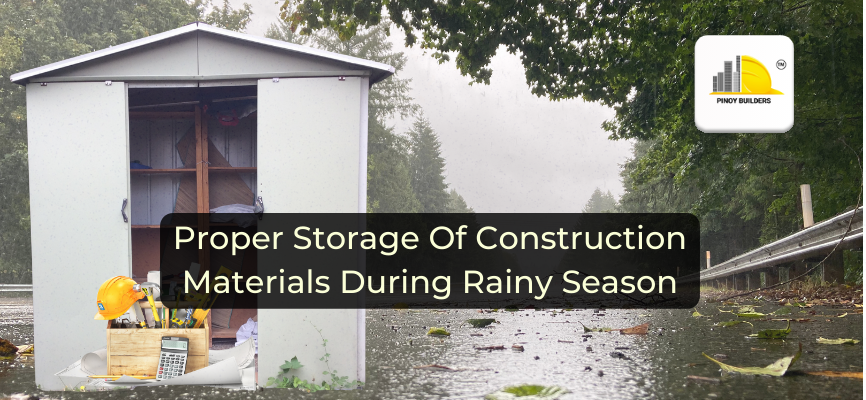Heavy rain has often troubled construction companies due to the difficult situations it brings. Slippage and poor visibility aside, the workplace materials are also burdened by bad weather, as they are prone to quality deterioration. This can trigger a chain of events that can lead to delays and accidents. Construction materials are extremely sensitive, and too much exposure to the elements can make them worthless. Knowing how to store them properly can make all the difference in this line of work.
Improper storage of construction equipment and materials during the rainy season can greatly affect a project’s cost and timeline. With this in mind, it is recommended to learn about the equipment and materials’ weaknesses ahead of time. This way, arrangements can be made way before the dreaded downpour arrives.
The safety measures and proper storing below must be adapted to secure the following construction materials.
Heavy Construction Equipment
Construction equipment have become more resistant to water damage in recent years. However, it does not mean that they are immune to breakage. As construction equipment is expensive, it would be a waste to be careless with such powerful tools. If these are not in use, turn them off and store them in a secure location. It also pays to have a complete inventory to ensure that they are all complete and in good condition.
Cement
It is not enough that cement is stored in a cement bag. These climatically sensitive materials should be stored inside a building or a shed that is moisture and leak proof. These bags should not be stacked more than ten times. During rainy seasons, the stacks of cement must be enclosed entirely and kept that way throughout its storage period.
Durable Materials
This kind of material should be stored at a location with a hard, dry, and leveled surface. If ever that it is unavailable, planks, old corrugated iron sheets, or even a thin layer of concrete can be used for it to stay in excellent condition.
- Aggregates – Be reminded that both fine and coarse aggregates must be stored separately by using dividing walls or separate containers. They should be stored where the effect of wind is minimum and should be covered by a polyethylene sheet. To maintain their quality, ensure that they are free from foreign factors like dust and modifiers.
- Bricks and Stones – These should be classified by type and should be stacked separately by groups of tens. Note that clay bricks containing lime should be soaked in water while on standby.
- Wood – Wood and rain naturally do not go well together. Because rain causes rot and warping in wood. Pile them at a dry, safe place should be a top priority.
- Pipes – Pipes should not be stacked more than 1.5 meters high and should not be stored in warm areas. They should also have stoppers at the bottom for stability.
Fragile Materials
Extra caution should be taken when dealing with breakables. They should be stored in secure locations.
- Glass – Glass is both fragile and dangerous if it is not handled correctly. Each sheet should have edge protectors to avoid worker injury during handling. When it comes to storage, glass sheets should only be stacked to a maximum of 25 sheets.
- Tiles – Like bricks, tiles should be stacked accordingly at an appropriate height of 1 meter.
- Liquid Flammables – Flammable materials like fuel, oil, paints, and varnishes should be kept at a cool area, away from heat and environmental danger until they are needed. The containers should be kept from wet elements to avoid rusting.
Hazardous Materials
Materials considered as major health risks, deemed corrosive, and volatile must be stored specific to its properties and requirements to prevent accidents.
- Asbestos – This is a disease-causing material that can cause problems for workers if they breathe it in. Asbestos is used for strengthening materials like concrete, but it should not be used unless the job calls for it. It should be stored at a secure location, free from air vents and away from the public eye.
- Acid – Handling acid requires proper protective gear. For storage, use Polyethylene, Polymethylpentene, and Teflon containers and keep it at a secure area. Inspect the containers regularly and make sure that they are leak-free. Store each batch separately.
- Explosives – Explosives are more volatile than the items listed in flammables and should be kept at a remote location until the need for it arises. They should also be free from moisture to avoid malfunctions caused by dampness.
The durability of these materials can be deceiving, as simple atmospheric exposure can endanger their integrity. They are liable to quality loss if they are improperly handled. Rain or shine, always take precautionary measures when managing important construction materials.
![]()










